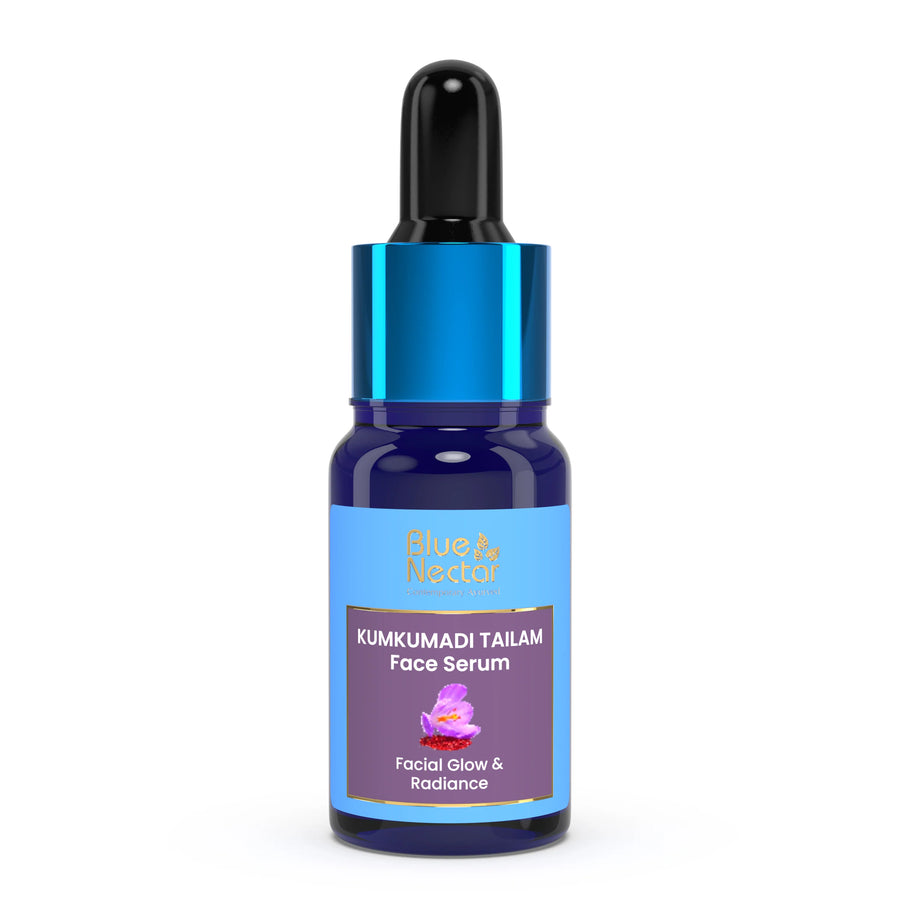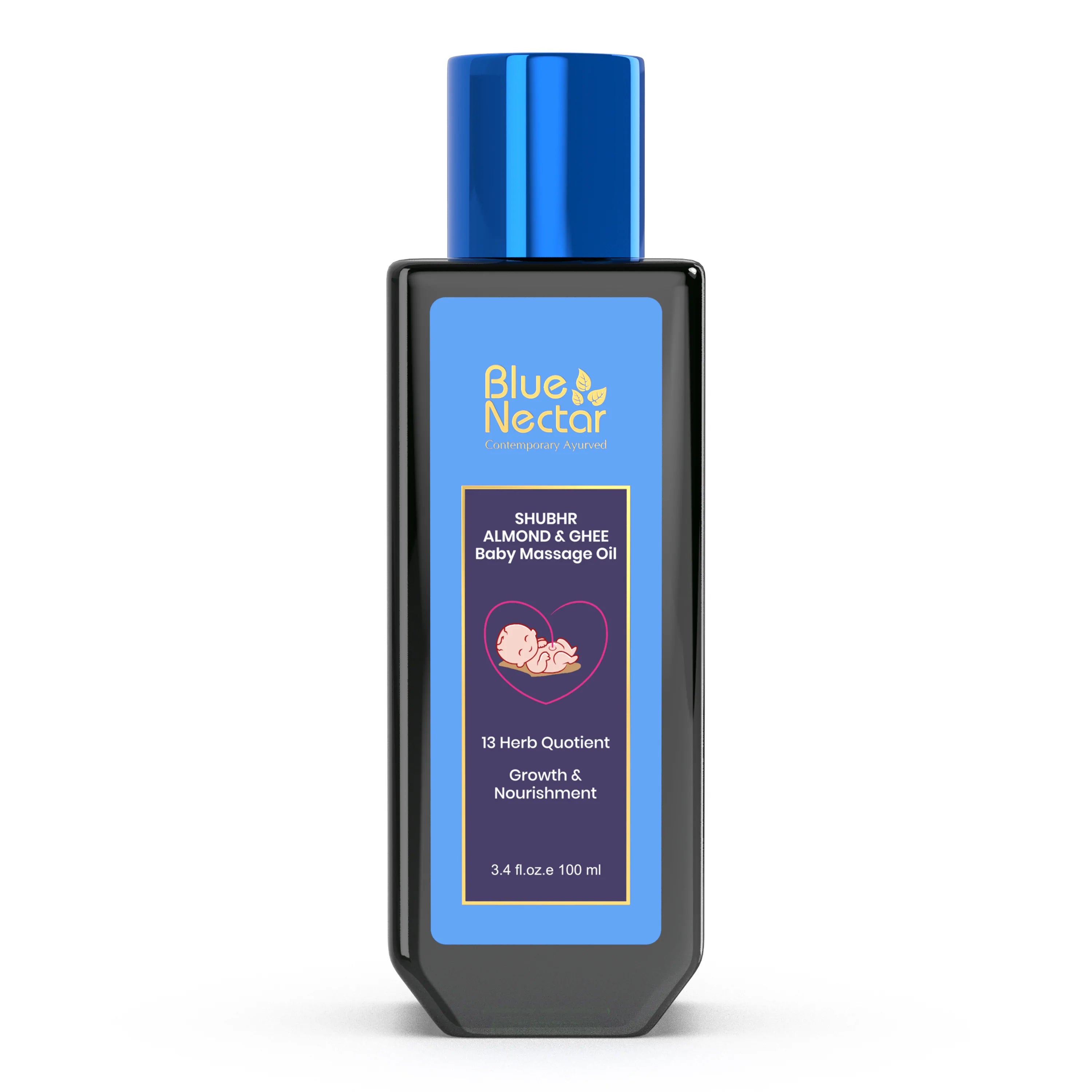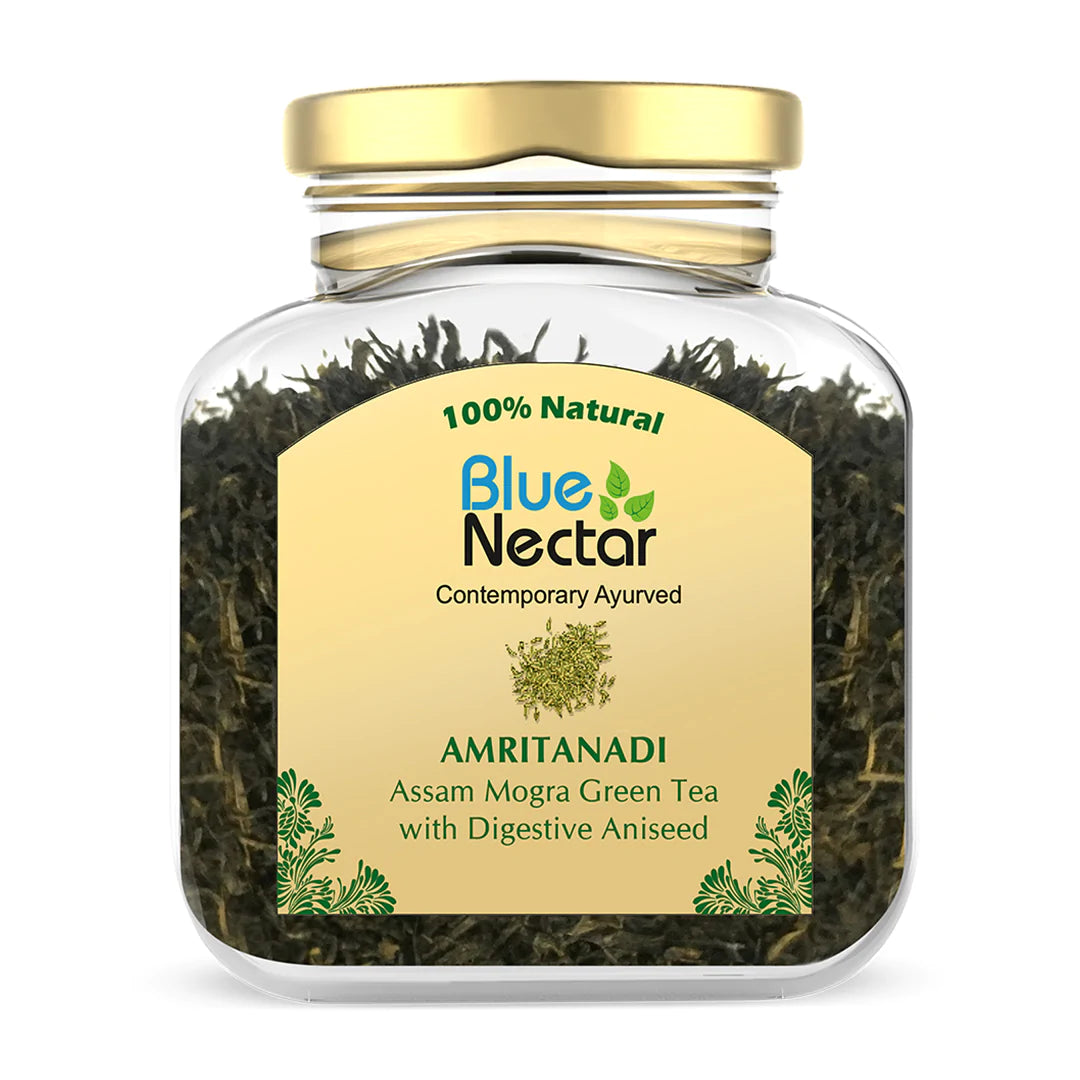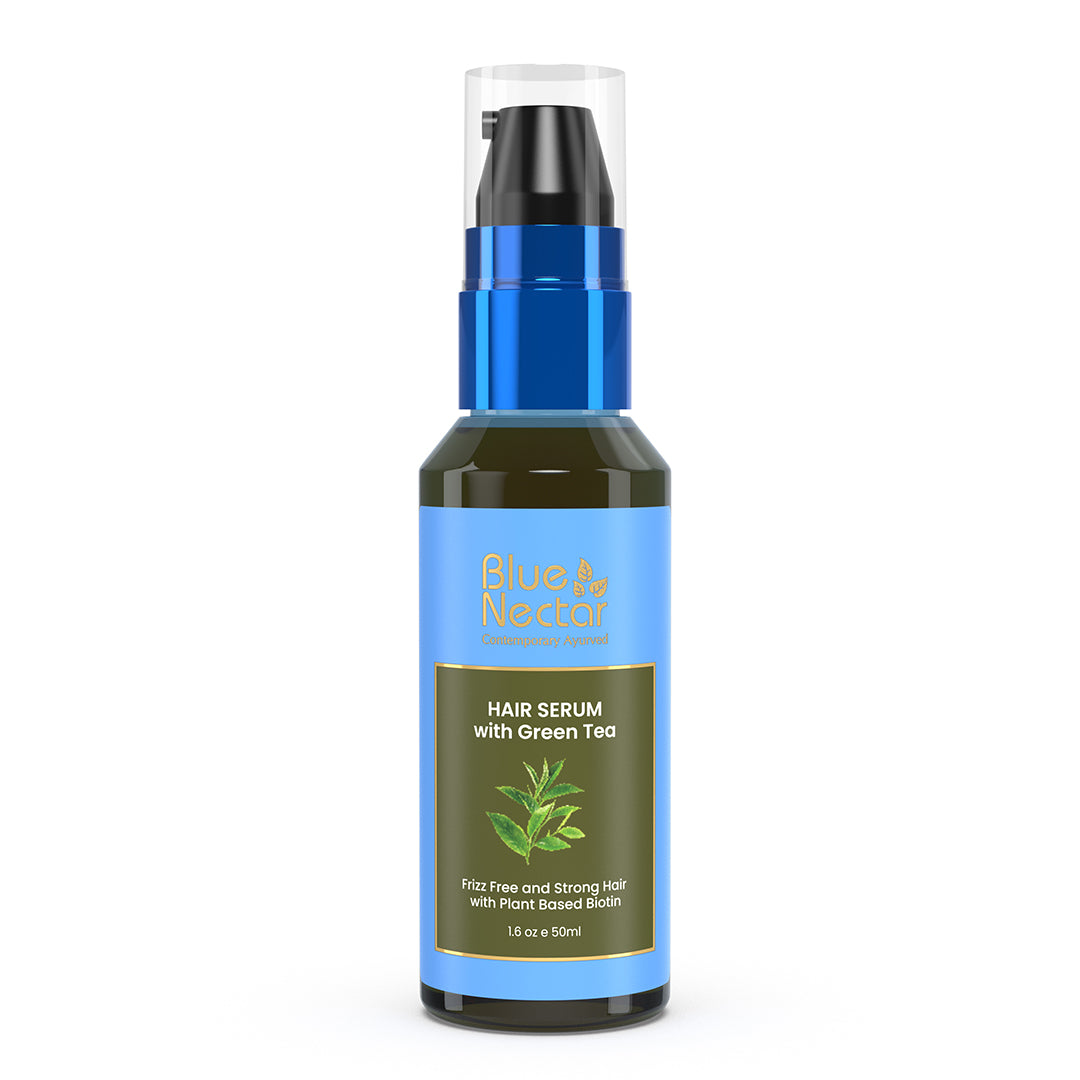Ayurvedic Skincare And Lifestyle Tips
| Estimated Reading Time: 11 minutes |
Ayurvedic skincare and lifestyle tips offer a holistic and time-tested approach to well-being, rooted in the ancient traditions of India. This ancient wisdom, with over 5,000 years of history, guides individuals toward achieving not only radiant skin but also a harmonious and balanced life and natural beauty. At the heart of Ayurveda lies the principle of doshas, which categorizes individuals into Vata, Pitta, or Kapha types based on their unique constitutions.

Understanding your dosha is the key to tailoring a natural skincare and lifestyle regimen that best suits your specific needs. By emphasizing natural ingredients, mindful practices, and a holistic approach to health, Ayurveda invites you to embark on a transformative journey toward lasting well-being and timeless beauty.
Table of Content:
|
Ayurvedic Lifestyle Tips For Glowing Skin
Ayurveda, the ancient Indian system of medicine, offers holistic approaches to achieving glowing skin and natural beauty. It emphasizes balancing the doshas (Vata, Pitta, and Kapha), maintaining proper digestion, and eliminating toxins from the body –
- Follow a Balanced Diet
Eat According to Your Dosha: In Ayurveda, different foods pacify different doshas. For example, people with a Pitta constitution should avoid spicy and oily foods. A Vata person should favor warm, cooked, and nourishing foods, while a Kapha person should focus on light, warm, and spicy foods.
Stay Hydrated: Drink plenty of water throughout the day. You can also incorporate herbal teas like chamomile or jasmine tea for additional hydration and antioxidants as non-toxic and healthy drinks
 .
.
- Proper Digestion
Eat Mindfully: Chew your food thoroughly and eat in a calm, peaceful environment. Avoid overeating and eating too quickly, as it hampers digestion.
Include Digestive Spices: Incorporate digestive spices like ginger, turmeric, cumin, and coriander in your meals. These spices aid digestion and help in detoxifying the body.
- Regular Exercise
Practice Yoga and Pranayama: Yoga postures and breathing exercises not only promote physical health but also improve circulation, which is essential for healthy skin.
Morning Walks: Taking a brisk walk in the morning fresh air helps improve blood circulation and gives a natural glow to the skin.
- Proper Sleep
Establish a Sleep Routine: Aim for 7-8 hours of sleep each night. Try to go to bed and wake up at the same time every day to regulate your body's internal clock.
Create a Relaxing Bedtime Ritual: Engage in calming activities before bedtime, such as reading a book, taking a warm bath, or practicing meditation. This helps in promoting deep, restorative sleep.
- Stress Management
Practice Meditation: Regular meditation reduces stress, promotes relaxation, and enhances overall well-being, reflecting positively on your skin.
Herbal Supplements: Adaptogenic herbs like Ashwagandha and Brahmi can help the body cope with stress.
- Skincare Routine
Use Natural Products: Ayurveda advocates the use of ayurveda products with natural ingredients like aloe vera, turmeric, neem, and sandalwood for skin care. These ingredients have antibacterial and skin-soothing properties.
Abhyanga (Self-Massage): Regular self-massage with warm Ayurvedic oils, especially before bathing, improves circulation and imparts a healthy glow to the skin.
Stay Sun Safe: Protect your skin from the harmful effects of the sun. Ayurveda recommends natural sunscreens like coconut oil and wearing protective clothing.

- Detoxification
Hydration: Drink warm water throughout the day to flush out toxins from the body.
Ayurvedic Cleansing: Periodic detoxification methods like Panchakarma cleanse the body internally, promoting clear and radiant skin.
- Emotional Well-being
Practice Gratitude: Cultivate a positive attitude and practice gratitude. Emotional well-being directly affects the skin’s health.
Stay Connected: Maintain healthy relationships and spend time with loved ones. Emotional support is crucial for overall well-being.
By incorporating these Ayurvedic principles into your lifestyle, you can achieve not only glowing skin but also overall health and wellness. Remember, consistency and patience are key when adopting ayurvedic treatment, as they work on balancing the body and mind naturally over time.
How Skin Type Is Defined By Dosha In Ayurveda?
In Ayurveda, the concept of skin types is closely related to the three doshas: Vata, Pitta, and Kapha. Each dosha has distinct characteristics, and individuals are often categorized based on predominant doshas to determine their skin type. Here's how skin types are defined by dosha in Ayurveda –
- Vata Skin Type
Characteristics: Vata skin tends to be dry, thin, delicate, and cool to the touch. It is prone to roughness, flakiness, and is easily affected by the wind and cold weather.
Imbalance: When Vata is imbalanced, the skin can become excessively dry, rough, and may develop wrinkles and fine lines prematurely. It may also be prone to conditions like eczema and psoriasis.
Care Tips: Moisturization is crucial for Vata skin. Using rich, nourishing oils such as sesame or almond oil helps keep the skin hydrated. Warm oil massages (Abhyanga) and regular moisturization are recommended to maintain the skin's natural moisture balance.

- Pitta Skin Type
Characteristics: Pitta skin is sensitive, fair, and prone to redness and inflammation. It can be warm to the touch and often freckled. Pitta skin is also prone to acne and sunburn.
Imbalance: Imbalanced Pitta can lead to various skin inflammations, including acne, rashes, and rosacea. Excessive sun exposure and spicy foods can aggravate Pitta skin.
Care Tips: Pitta skin benefits from cooling and soothing treatments. Using cooling oils like coconut oil and incorporating ingredients like aloe vera, cucumber, and sandalwood in skincare routines can help calm and balance Pitta skin.
- Kapha Skin Type
Characteristics: Kapha skin is thick, oily, and cool to the touch. It has a natural radiance and is less prone to wrinkles. Kapha skin is often well-hydrated but can be excessively oily and prone to enlarged pores and blackheads.
Imbalance: Imbalanced Kapha can lead to excessive oiliness, enlarged pores, and acne. Lack of proper cleansing and a sedentary lifestyle can aggravate Kapha skin.
Care Tips: Kapha skin benefits from regular cleansing and exfoliation to prevent excess oil build-up. Using light, non-comedogenic oils like jojoba and incorporating ingredients like lemon, honey, and turmeric in skincare routines can help balance Kapha skin.
Understanding your predominant dosha can help tailor your skincare routine to maintain balance and promote healthy, glowing skin according to Ayurvedic principles. It's essential to consult with an Ayurvedic practitioner for personalized guidance and affordable skin care based on your unique constitution and skin type.
Natural Ayurvedic Herbs For Beautiful Glowing Skin
Ayurveda, the ancient Indian system of medicine, offers a wealth of natural herbs that are believed to promote beautiful, glowing skin. These herbs are often used in various Ayurvedic treatments and skincare routines. Here are some natural Ayurvedic herbs for beautiful, glowing skin –
1. Turmeric (Curcuma longa)
Turmeric has powerful anti-inflammatory and antioxidant properties. It helps in reducing acne, brightening the skin, and providing a natural glow.
Mix turmeric powder with yogurt or honey to create a paste. Apply it as a face mask. Turmeric can also be consumed internally in warm milk.

2. Neem (Azadirachta indica)
Neem is known for its antibacterial, antifungal, and blood-purifying properties. It helps in treating acne, eczema, and other skin infections.
Make a paste of neem leaves and apply it as a face mask. Neem oil can also be diluted and applied to the skin for various skin issues.
3. Aloe Vera (Aloe barbadensis miller)
Aloe vera is hydrating, soothing, and promotes healing. It helps in reducing inflammation, sunburn, and acne scars, giving the skin a natural glow.
Extract the gel from fresh aloe vera leaves and apply it directly to the skin. Aloe vera gel is also available commercially and can be used topically.
4. Sandalwood (Santalum album)
Sandalwood has cooling and antimicrobial properties. It helps in improving skin tone, reducing blemishes, and giving the skin a radiant glow.
Mix sandalwood powder with rose water or milk to make a paste. Apply it as a face mask. Sandalwood oil can also be diluted and applied to the skin.
5. Rose (Rosa)
Rose petals are rich in antioxidants and have a soothing effect on the skin. They help in maintaining skin's pH balance, hydrating the skin, and providing a natural glow.
Make a paste of crushed rose petals with yogurt or honey. Apply it as a face mask. Rose water can also be used as a toner for the skin.

6. Triphala
Triphala is a combination of three fruits: Amalaki (Emblica officinalis), Bibhitaki (Terminalia bellirica), and Haritaki (Terminalia chebula). It is a powerful antioxidant and detoxifier that helps in improving skin complexion and reducing signs of aging.
Triphala powder can be consumed internally with honey or water. It is also available in the form of capsules.
7. Manjistha (Rubia cordifolia)
Manjistha is a blood-purifying herb that helps in detoxifying the body. It improves complexion, reduces blemishes, and promotes healthy, glowing skin.
Manjistha powder can be mixed with honey or water and consumed internally. It is also available in the form of capsules.
When using these herbs for skincare, it's essential to perform a patch test, especially if you have sensitive skin, to ensure you do not have an adverse reaction.
Dos And Don’ts Of Ayurveda For A Glowing Complexion
Ayurveda, the ancient system of holistic healing, offers a comprehensive approach to achieving a glowing complexion. Here are the dos and don'ts of Ayurveda for promoting a radiant and healthy skin –
Dos –
-
Know Your Dosha: Understand your dosha (Vata, Pitta, or Kapha) and follow a skincare and dietary routine that balances your dosha. Ayurveda believes that balancing your inner energies leads to eternal radiance.
-
Eat a Balanced Diet: Consume a diet that supports your dosha balance. Include fresh, seasonal, and organic fruits and vegetables. Favor foods like ghee, turmeric, and a variety of spices known for their skin-healing properties.
-
Stay Hydrated: Drink warm water throughout the day to flush out toxins. Herbal teas like chamomile or mint can also be beneficial.
-
Practice Abhyanga (Oil Massage): Regularly massage your body with warm, dosha-specific oils like sesame (Vata), coconut (Pitta), or mustard (Kapha) oil before bathing. This enhances blood circulation and nourishes the skin.
-
Use Natural Skincare Products: Prefer natural, chemical-free skincare products. Look for ingredients like aloe vera, turmeric, neem, and sandalwood, known for their skin-enhancing properties. Try using non-toxic makeup products as much as possible.

-
Get Proper Sleep: Aim for 7-8 hours of quality sleep each night. Your skin rejuvenates and heals during sleep, contributing to a healthy complexion.
- Practice Yoga and Meditation: Yoga postures and meditation calm the mind, reduce stress, and promote a radiant complexion. Pranayama (breathing exercises) enhances oxygen supply to the skin.
- Cleanse Regularly: Cleanse your face and body regularly to remove dirt and toxins. Use natural cleansers like chickpea flour (besan) or oatmeal mixed with water.
- Use Rose Water: Spritz your face with rose water, a natural toner, to balance the skin’s pH and add a subtle glow.
- Stay Positive: Cultivate a positive mindset. Emotions and mental well-being significantly impact your skin’s health. Practice gratitude and manage stress through relaxation techniques.
Don'ts –
-
Avoid Excessive Sun Exposure: Protect your skin from harmful UV rays. Ayurveda suggests natural sunscreens like coconut oil. Wear protective clothing and avoid direct sunlight during peak hours.
-
Avoid Harsh Chemicals: Refrain from using harsh chemical-based skincare products. They can strip the skin of natural oils and cause imbalances.
-
Don’t Suppress Natural Urges: Avoid suppressing natural urges like sneezing, urination, or bowel movements. Suppression can lead to toxin build-up and affect skin health.
-
Limit Caffeine and Alcohol: Excessive caffeine and alcohol consumption can dehydrate the body, leading to dull and tired-looking skin. Consume these in moderation.
-
Avoid Heavy, Fried, and Spicy Foods: Such foods can imbalance your doshas. They can lead to skin inflammations, acne, and digestive issues, all of which affect the complexion negatively.
- Avoid Stress: Chronic stress negatively impacts skin health. Practice stress-relieving activities like yoga, meditation, or spending time in nature.

-
Avoid Overindulgence: Overeating, especially heavy or processed foods, overwhelms the digestive system, leading to toxin accumulation. This can manifest as skin issues.
- Don’t Overwash Your Face: Excessive washing can strip away natural oils. Cleanse your face twice a day, but avoid over-cleansing.
By following these dos and don'ts of Ayurveda, you can nurture your natural beauty from the inside out, leading to a naturally glowing and healthy complexion.
Conclusion -
Embracing Ayurvedic skincare and lifestyle practices can transform your approach to beauty, focusing on holistic well-being rather than mere external appearance. The wisdom of Ayurveda, rooted in balance and natural remedies, offers a treasure trove of knowledge for natural haircare and nurturing radiant skin. By understanding your dosha, choosing appropriate skincare routines, incorporating nourishing herbs, and living in harmony with nature, you pave the way for a glowing complexion and overall wellness.
Frequently Asked Questions (FAQ)
- Is Ayurveda Better For Skin?
Ayurveda offers a natural and holistic approach to skincare, emphasizing balance and using natural ingredients. Many individuals find Ayurvedic skincare beneficial for their skin as it focuses on overall well-being and can be gentler, especially for sensitive skin types.
- How Long Does It Take To See Results From Ayurvedic Skin Care Practices?
The time it takes to see results from Ayurvedic skin care practices can vary from person to person. Generally, consistent practices may show improvements in a few weeks to a few months. Patience and adherence to a balanced Ayurvedic routine are key to achieving long-lasting results.
- Can Ayurveda Cure Skin Problems?
Ayurveda can help manage and alleviate various skin problems, especially when they are related to imbalances in the body. Ayurveda can help manage and alleviate various skin problems, especially when they are related to imbalances in the body.
Recommended Products by Blue Nectar:
Shubhr Turmeric Star Anise Powder Face Cleanser for Glowing Skin
Shubhr Neem Face Cleanser | Acne Control & Oil Balancing
Kumkumadi Tailam Face Serum for Glowing Skin with Pure Sandalwood & Saffron
Balalakashadi Jasmine Bath & Body Massage Oil | Skin Hydration & Relaxation
Niraa Shea Butter Warm Vanilla Body lotion with Vitamin E | Moisturizer for Dry Skin


















